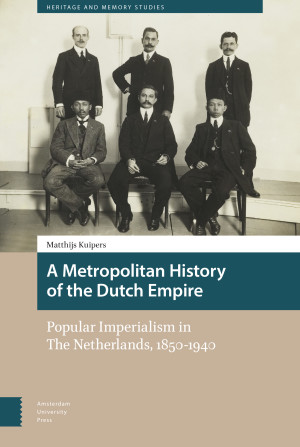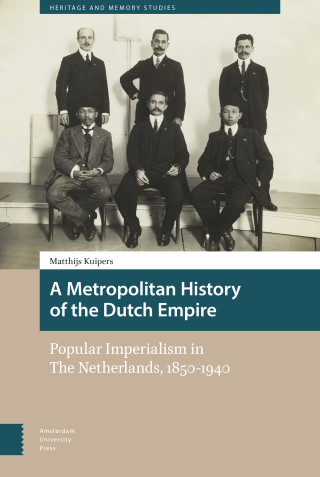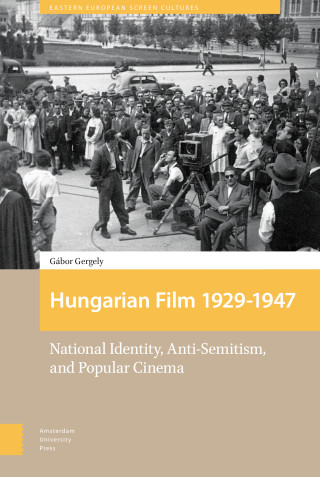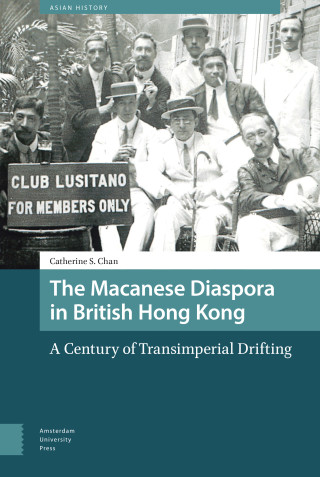

- Title
- A Metropolitan History of the Dutch Empire
- Subtitle
- Popular Imperialism in The Netherlands, 1850-1940
- Author
- Matthijs Kuipers
- Price
- € 140,99
- ISBN
- 9789048550241
- Format
- eBook PDF (Adobe DRM)
- Number of pages
- 232
- Language
- English
- Publication date
- 25 - 02 - 2022
- Dimensions
- 15.6 x 23.4 cm
- Partner

- Categories
- Cultural Studies
- Dutch and The Netherlands
- Heritage and Memory Studies
- Modern History
- Sociology and Social History
- Discipline
- History, Art History, and Archaeology
- Preview
- Download Preview
- Also available as
- Hardback - € 141,00
List of Abbreviations
On Names and Terminology
Introduction: The Still Waters of Empire Run Deep
Dutch Indifference
The Metropole in the Colonial World
Conquering the Metropolitan Mind
The Politics of History
Case Studies from a Fragmented Empire
1 Food and Indifference: A Cultural History of the Rijsttafel in the Netherlands
Dichotomies of a Colonial Dish
The Metropolitan Rijsttafel
Who’s Cooking?
The Politics of Colonial Food
The Limits of Permeation (Conclusion)
2 Indonesians and Cultural Citizenship: The Metropolitan Microcosm of Empire
Dissent and Cultural Citizenship
Wim Tehupeiory: Naturalization and Social Mobility
Tjipto Mangoenkoesoemo: Political Dissent in the Metropole
Jodjana: The Arts and the Idea of Association
Imperial Citizenship and Double Consciousness (Conclusion)
3 Schools and Propaganda: History Books and Schools as Sites of Imperial Campaigns
Schools, Teachers and Pupils
History Lessons
‘Classroom Collections’
Maps on the Wall (Conclusion)
4 Scouting and the Racialized Other: Imperial Tropes in the Dutch Scouting Movement
The Advent of Dutch Scouting
An Empire without Boys
Imperial Imagery in Dutch Scouting
The 1937 Jamboree
Scouting and Dutch Imperialism (Conclusion)
5 Missionary Organizations and the Metropolitan Public: The ‘Inner Mission’ and the Invention of Mission Festivals
Internal Colonialism
Mission Festivals
The Choice of a Missionary Career
Gendered Role Models
Finding Funds (Conclusion)
Conclusion: A Fragmented Empire
Sources
Archives and Libraries
Published Primary Sources
Published Secondary Sources
Index
List of Figures and Tables
Figures
Figure 1 A modern-day Javanese tumpeng
Figure 2 Mrs. Catenius-van der Meijden
Figure 3 A rijsttafel in a colonial domestic setting
Figure 4 Drawing of Oost en West’s coat of arms
Figure 5 Boeatan’s tearoom
Figure 6 Portrait of the Indiërs Comité
Figure 7 Jodjana performing in Germany
Figure 8 Poster announcing the 1937 World Scout Jamboree in Vogelenzang, Netherlands
Tables
Table 1 Annual number of classroom collections sent out by the Koloniaal Museum and the reported number requested by schools
Table 2 Number of annual visitors to the Koloniaal Museum
Table 3 Annual balance of the Nederlandsch Zendelinggenootschap in the 1880s
On Names and Terminology
Introduction: The Still Waters of Empire Run Deep
Dutch Indifference
The Metropole in the Colonial World
Conquering the Metropolitan Mind
The Politics of History
Case Studies from a Fragmented Empire
1 Food and Indifference: A Cultural History of the Rijsttafel in the Netherlands
Dichotomies of a Colonial Dish
The Metropolitan Rijsttafel
Who’s Cooking?
The Politics of Colonial Food
The Limits of Permeation (Conclusion)
2 Indonesians and Cultural Citizenship: The Metropolitan Microcosm of Empire
Dissent and Cultural Citizenship
Wim Tehupeiory: Naturalization and Social Mobility
Tjipto Mangoenkoesoemo: Political Dissent in the Metropole
Jodjana: The Arts and the Idea of Association
Imperial Citizenship and Double Consciousness (Conclusion)
3 Schools and Propaganda: History Books and Schools as Sites of Imperial Campaigns
Schools, Teachers and Pupils
History Lessons
‘Classroom Collections’
Maps on the Wall (Conclusion)
4 Scouting and the Racialized Other: Imperial Tropes in the Dutch Scouting Movement
The Advent of Dutch Scouting
An Empire without Boys
Imperial Imagery in Dutch Scouting
The 1937 Jamboree
Scouting and Dutch Imperialism (Conclusion)
5 Missionary Organizations and the Metropolitan Public: The ‘Inner Mission’ and the Invention of Mission Festivals
Internal Colonialism
Mission Festivals
The Choice of a Missionary Career
Gendered Role Models
Finding Funds (Conclusion)
Conclusion: A Fragmented Empire
Sources
Archives and Libraries
Published Primary Sources
Published Secondary Sources
Index
List of Figures and Tables
Figures
Figure 1 A modern-day Javanese tumpeng
Figure 2 Mrs. Catenius-van der Meijden
Figure 3 A rijsttafel in a colonial domestic setting
Figure 4 Drawing of Oost en West’s coat of arms
Figure 5 Boeatan’s tearoom
Figure 6 Portrait of the Indiërs Comité
Figure 7 Jodjana performing in Germany
Figure 8 Poster announcing the 1937 World Scout Jamboree in Vogelenzang, Netherlands
Tables
Table 1 Annual number of classroom collections sent out by the Koloniaal Museum and the reported number requested by schools
Table 2 Number of annual visitors to the Koloniaal Museum
Table 3 Annual balance of the Nederlandsch Zendelinggenootschap in the 1880s
Reviews and Features
"Kuipers’ characterization of patchy imperial enthusiasm bears profoundly on questions of colonial memory today. In this respect, Kuipers’ study adds important historical pretext to a growing scholarly and popular interest in the contemporary legacies of colonialism in the Netherlands. [...] by historicizing how notions of a strict metropole colony divide emerged in the Netherlands, Kuipers’ study leaves us much better equipped to challenge other inherited paradigms that cleave the study of the Dutch empire."
- Chelsea Schields, BMGN — Low Countries Historical Review, Vol. 138 (2023)
- Chelsea Schields, BMGN — Low Countries Historical Review, Vol. 138 (2023)
Matthijs Kuipers
A Metropolitan History of the Dutch Empire
Popular Imperialism in The Netherlands, 1850-1940
A Metropolitan History of the Dutch Empire: Popular Imperialism in The Netherlands, 1850-1940 examines popular imperial culture in the Netherlands around the turn of the twentieth century. In various and sometimes unexpected places in civil society the empire played a prominent role and was key in mobilizing people for causes that were directly and indirectly related to the Dutch overseas colonies. At the same time, however, the empire was ostensibly absent from people's minds. Except for some jingoist outbursts during the Aceh War and the Boer War, indifference was the main attitude with which imperial affairs were greeted. How could the empire simultaneously be present and absent in metropolitan life? Drawing upon the works of scholars from fields ranging from postcolonial studies to Habsburg imperialism, the author argues that indifference to empire was not an anomaly to the idea of an all-permeating imperial culture, but rather the logical consequence of an imperial ideology that rendered metropole and colony firmly separated entities. The different groups and individuals that advocated imperial or anti-imperial causes – such as missionaries, former colonials, Indonesian students, and boy scouts – hardly ever related to each other explicitly and had their own distinctive modes of expression, but were nonetheless part of what the author calls a 'fragmented empire' and shared the common thread of Dutch imperial ideology. This suggests we should not mistake colonial culture's metropolitan invisibility for a lack of strength.
Author
Matthijs Kuipers
Dr. Matthijs Kuipers lectured on (post)colonial history, humanitarianism, human rights, and racism at Utrecht University and is now employed by Nationaal Comité 4 en 5 mei. He defended his PhD thesis on popular imperialism in the Netherlands in 2018 at the European University Institute in Florence and has published on topics ranging from colonial propaganda to the imperial dimension of the Dutch boy scouts.




